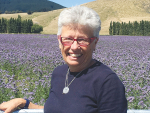Jenni Vernon reckons her love for the land and livestock was forged as a child, helping her grandfather feed out mangels on farm.
Today, after more than four decades in farming and public sector leadership, she remains passionate about giving back to the industry.
Vernon has taken on the role of independent chair of the steering committee for the Hill Country Futures Partnership programme. It's a task she combines with her job as a principal adviser for the Ministry for Primary Industries and other governance positions - including with the Agri-Women's Development Trust (AWDT) and the National Fieldays Society.
Vernon was also New Zealand's first female Nuffield Scholar and the first woman chair of Environment Waikato.
With research work undertaken for the five year, $8.1m Hill Country Futures Partnership programme now drawing to a close, she is looking forward to seeing the long-term outcomes for hill country farmers.
"This is only the beginning of the journey and that's why I find it so exciting. We have study sites all over New Zealand and people have been very keen to engage with the programme," she explains.
Vernon says the next step is to put all this science and research into tangible tools.
"A big part of it has been about recognising how valuable hill country farming is to New Zealand society and ultimately the work that has been done will also add value to our markets."
The five year programme is co-funded by Beef + Lamb New Zealand, the Ministry of Business, Innovation and Employment, PGG Wrightson Seeds and Seed Force New Zealand. It is focused on future proofing the profitability, sustainability and wellbeing of New Zealand's hill country farms.
The programme incorporates traditional science research, farmer knowledge, social research and citizen science. It has a strong emphasis on forages and providing decision-making tools to help farmers select the best forage option for different land management units. Vernon sees the project as important because she believes that hill country farming in the New Zealand is often neglected.
"When I was growing up, following my grandfather around in the Ruahine Hills, sheep and beef farming was front-of-mind when New Zealand agriculture was mentioned. Today, you hear more about dairy and kiwifruit. But there is still a huge acreage of hill country farming that is very valuable to our economy and has some of the most unique rural communities," she explains.
"New Zealand needs hill country farming and we need future hill country farmers. The Hill Country Futures Partnership is about how we still have those rural communities and how we help the sector to remain profitable and resilient in the face of many challenges."
Vernon says she's excited about the opportunities around biodiversity and the forage landscape, including the potential to integrate natives shrubs as grazing fodder as part of integrated farming systems. "We now have a national database, which will expand, and can be accessed to find if a plant will grow in a particular location. I think that will be of great value alongside the land classification tools and understanding what legumes and crops can be grown on hill country," she adds.
"It will support hill country farmers to become more versatile. As our most beautiful soils get gobbled up for urban living, hill country can become even more valuable and important in the scheme of the New Zealand primary sector. Opportunities may come from markets you don't expect."
From The Classroom To The Boardroom
Vernon originally trained as a teacher in Christchurch, where she also joined New Zealand Young Farmers - providing her first step into leadership and public speaking.
In 1977, she was awarded a NZ Young Farmers Exchange trip to America to learn about US agricultural methods. She went on to become president of Young Farmers, where she "got to learn about farming from a national perspective".
Jenni and husband Gordon have been farming together for 42 years - originally in dairy farming but now sheep and beef on a dry stock property in the Western hills of Waikato.
Being "hill country ourselves, although not steep hill country", she recognises the challenges that farmers face and the passion and values that drive them - and the tough decisions that sometimes need to be made.
Vernon spent eight years as a divisional director for the National Party, learning a lot abotu leadership, policy, politics and central government. She returned to university in 1993, gaining a master's degree in environmental management. She also has a post graduate diploma in environmental law and took up the Nuffield scholarship.
"I had already done the Kellogg Rural Leadership programme and Nuffiled was an amazing opportunity to represent New Zealand agriculture overseas - something I have done on a number of occasions - and also to understand our place in the world and what a competitive world it is," Vernon explains.
Back in New Zealand and seeking a new leadership opportunity, she ran successfully for the Waikato Regional Council.
"Regional councils are very important in farming and it seemed a good opportunity for me to stand for the rural community, as a farmer and continue to provide a rural voice at the table. I did that for 12 years, until 2007, including as chair of Environment Waikato. I loved it. It was an amazing opportunity and, in particular, the opportunity to work with Māori was a great privilege for me."
Vernon went on to work in resource planning for the Waikato District Council, leading a district plan review and private plan changes. In 2017, she took a gap year before returning to the fray, taking on her AWDT role, joining MPI and agreeing to head the Hill Country Futures Partnership steering committee.
She says she is now looking forward to seeing results of the programming over the coming years.



















